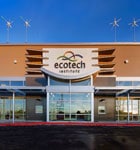WHO

Glenn Wilson is the academic dean of Colorado's Ecotech University, which opened in 2010.
Education Corporation of America (ECA) got its idea for Ecotech Institute after having conversations with employers nationwide. “We were told of great growth in the clean energy sector but not enough technicians to operate and maintain some pretty sophisticated equipment,” says academic dean Glenn Wilson. So it created a college that is wholly focused on preparing graduates for careers in renewable energy, energy efficiency, and sustainable design. To date, it is the only such institution.
The Building Breakdown
Renewable Energy
More than 65,000 kilowatt-hours are generated annually at Ecotech Institute. The former warehouse now features building-integrated photovoltaics, Kestral e150 building-mounted wind turbines and an Urban Green Energy vertical-axis turbine (provided by Solvento), two Envision Solar solar trees, and a solar canopy, courtesy of Integrated Solar Design.
Energy and Water
The school uses demand-control ventilation, high-efficiency air-conditioning and lighting, a zoned temperature-control system, and real-time monitoring of power, gas, water consumption, and renewable-energy production. WaterSense low-flow fixtures are used to reduce water use by 41 percent.
Materials and Resources
Carpet, insulation, and millwork are among the building’s many elements that contain recycled content. Ecotech Institute also features bamboo flooring, certified wood, and a recycling center that can accommodate a volume of approximately 150 pounds of waste per day.
Indoor Air Quality
The institute uses GreenGuard Indoor Air Quality Certified furniture throughout the facility, as well as low- or zero-VOC paint and tile. Pollutant-source-control entryways also help improve indoor air quality.
Computers and Technology
A zero-client computing system eliminates the need for desktop maintenance and additional air-conditioning (zero-client systems produce minimal heat), allowing each computer to use a fraction of the energy a typical workstation would consume.
WHAT
Ecotech Institute offers what oftentimes isn’t often available from traditional colleges and universities. “Employers need people who can understand current communication systems, programmable controllers, and instrumentation,” Wilson says. “It has created a gap in our educational system. But we are confident Ecotech Institute is … closing that gap.” And it is doing so in a building as forward-thinking as its curriculum: Rob Walker Architects converted a warehouse—one that’s served numerous uses since being built in 1986—into a $5.8 million, LEED Gold-certified facility.
WHEN
Classes began at a temporary facility in April 2010, with the school moving into its permanent location in January 2011. Though only 50 students enrolled in the institute initially, that number had swelled to 400 by the end of 2011, and Ecotech Institute’s inaugural class graduated in June 2012. Wilson is excited to see those first graduates released into the working world. “We’re very optimistic about how successful we will be in placing students in jobs, based on the response we’ve had from quite a few companies already,” he says.

The materials used to build Ecotech contain recycled content, while computers are designed to conserve energy.
WHERE
Ecotech Institute’s location in Aurora, Colorado—a suburb of Denver—is the result of careful and thoughtful consideration. “Denver had a confluence of quite a few critical factors,” Wilson says. “The weather is perfect for wind and solar, there are lot of great projects going on in the state, and [as a] legislative leader [there] is a really good environment for working in this state.” Other factors weighing in Denver’s favor included an abundance of high quality schools, great businesses already in the area, and a premier clean energy cluster.
WHY
Ecotech Institute is a crucial piece in the puzzle of clean-tech education. “It’s the labs and the hands-on [opportunities] that really separate us from other schools,” Wilson says, “and that’s what excites companies when they come and look at our facilities.” The State of Colorado is equally pleased to host Ecotech Institute, he adds. “When companies consider relocating, economic development is a critical parameter they consider,” he says. “So they’re using our school as a sort of showcase for the type of graduates and skills the state can produce. And that’s very attractive when trying to get manufacturing businesses to locate to this region.”

